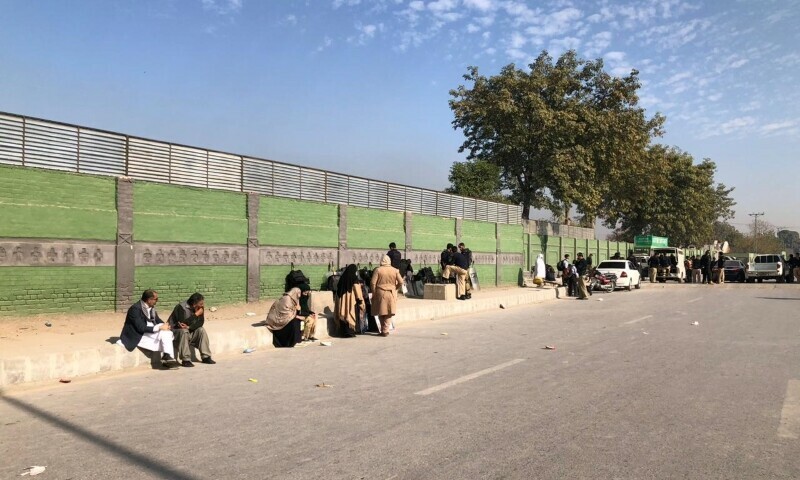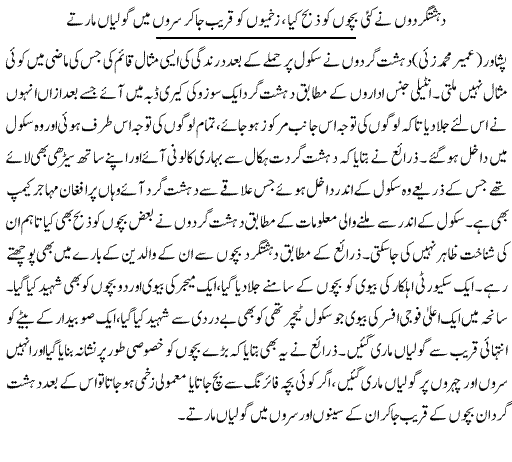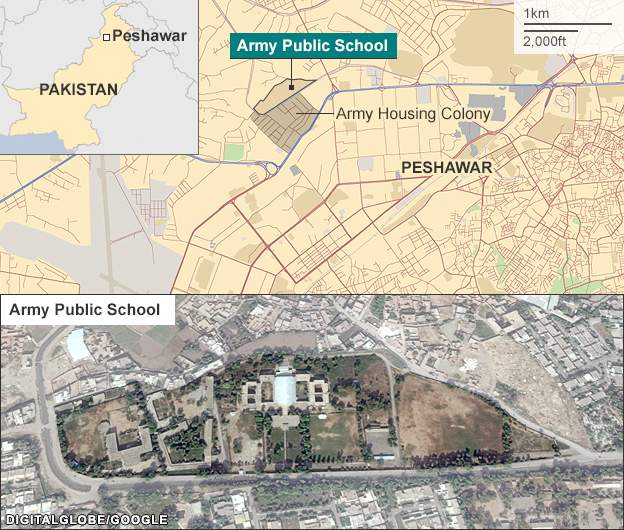ghazi52
PDF THINK TANK: ANALYST

- Joined
- Mar 21, 2007
- Messages
- 104,348
- Reaction score
- 106
- Country
- Location
,.,.,
December 16, 2022

EIGHT years ago today, the trail of terror and destruction wreaked across this country since nearly a decade before reached its apotheosis in the Army Public School, Peshawar, attack. As the horror unfolded on television screens across the country, distraught parents could be seen milling at the school gates, their children at the mercy of pitiless assailants on a rampage inside the premises.
By the time the sound of gunfire and explosions from within had fallen silent and the militants killed, nearly 150 people had lost their lives, 132 of them minors. It was the worst terrorist attack in Pakistan, its impact all the more searing because of the tender age of most of the victims. To a traumatised nation, it seemed life could never again be the same.
The PML-N government almost immediately called a multiparty conference to arrive at a consensus on the way ahead. What emerged from the moot was the National Action Plan — a 20-point blueprint (subsequently revised) for rooting out extremism.
It was a whole-of-society approach meant to complement the military operation that had already begun targeting TTP strongholds in the northern areas some six months earlier.
But here we are, on the eighth anniversary of the APS carnage, bracing for militant attacks once again. Failure to implement the NAP in its true spirit and the lacklustre follow-up on reforms and institution-building — of Nacta in particular — that was to reinforce what was essentially a laundry list of things to do, is much to blame.
Instead, the state put its weight behind measures that gave the appearance of robust action against militancy, such as setting up military courts and lifting the moratorium on the death penalty.
The orgy of state-sanctioned violence that followed only underscored the dysfunctionality of our criminal justice system, which is yet to see wide-ranging reforms — one of NAP’s 20 points.

Action against violent extremist groups only happened in earnest after FATF placed Pakistan on its grey list, from which it has only recently been taken off. Some high-profile militants meanwhile ‘escaped’ from the state’s custody or, more recently, were handed over to the Afghan Taliban in an effort to revive ‘negotiations’ with the TTP.
Those on-again off-again talks predictably came to naught, having only given an advantage to the TTP — as recently stated in a Nacta report. More difficult to comprehend was the state’s refusal to acknowledge the revival in militancy, despite massive public rallies in Swat and the tribal districts demanding action against these elements.
The people’s refusal to countenance being terrorised once again by violent extremists is a positive development. But the current political divide is unlike any ever before. At the MPC called after the APS attack, political leaders across the board, including Nawaz Sharif and Imran Khan, sat down together to confer. That is the kind of maturity we need from the political leadership today. Are they capable of it?
Published in Dawn, December 16th, 2022

The APS attack
On December 14, 2014, 131 schoolchildren and 10 other people were martyred when heavily armed militants stormed the school and fired at children who were attending classes at the time.
A dark day
EditorialDecember 16, 2022
EIGHT years ago today, the trail of terror and destruction wreaked across this country since nearly a decade before reached its apotheosis in the Army Public School, Peshawar, attack. As the horror unfolded on television screens across the country, distraught parents could be seen milling at the school gates, their children at the mercy of pitiless assailants on a rampage inside the premises.
By the time the sound of gunfire and explosions from within had fallen silent and the militants killed, nearly 150 people had lost their lives, 132 of them minors. It was the worst terrorist attack in Pakistan, its impact all the more searing because of the tender age of most of the victims. To a traumatised nation, it seemed life could never again be the same.
The PML-N government almost immediately called a multiparty conference to arrive at a consensus on the way ahead. What emerged from the moot was the National Action Plan — a 20-point blueprint (subsequently revised) for rooting out extremism.
It was a whole-of-society approach meant to complement the military operation that had already begun targeting TTP strongholds in the northern areas some six months earlier.
But here we are, on the eighth anniversary of the APS carnage, bracing for militant attacks once again. Failure to implement the NAP in its true spirit and the lacklustre follow-up on reforms and institution-building — of Nacta in particular — that was to reinforce what was essentially a laundry list of things to do, is much to blame.
Instead, the state put its weight behind measures that gave the appearance of robust action against militancy, such as setting up military courts and lifting the moratorium on the death penalty.
The orgy of state-sanctioned violence that followed only underscored the dysfunctionality of our criminal justice system, which is yet to see wide-ranging reforms — one of NAP’s 20 points.
Action against violent extremist groups only happened in earnest after FATF placed Pakistan on its grey list, from which it has only recently been taken off. Some high-profile militants meanwhile ‘escaped’ from the state’s custody or, more recently, were handed over to the Afghan Taliban in an effort to revive ‘negotiations’ with the TTP.
Those on-again off-again talks predictably came to naught, having only given an advantage to the TTP — as recently stated in a Nacta report. More difficult to comprehend was the state’s refusal to acknowledge the revival in militancy, despite massive public rallies in Swat and the tribal districts demanding action against these elements.
The people’s refusal to countenance being terrorised once again by violent extremists is a positive development. But the current political divide is unlike any ever before. At the MPC called after the APS attack, political leaders across the board, including Nawaz Sharif and Imran Khan, sat down together to confer. That is the kind of maturity we need from the political leadership today. Are they capable of it?
Published in Dawn, December 16th, 2022

A dark day
Failure to implement the NAP in its true spirit and the lacklustre follow-up on reforms and institution-building is much to blame.
www.dawn.com
The APS attack
On December 14, 2014, 131 schoolchildren and 10 other people were martyred when heavily armed militants stormed the school and fired at children who were attending classes at the time.







 . Keep doing what didn't work already, instead back fired.
. Keep doing what didn't work already, instead back fired.
